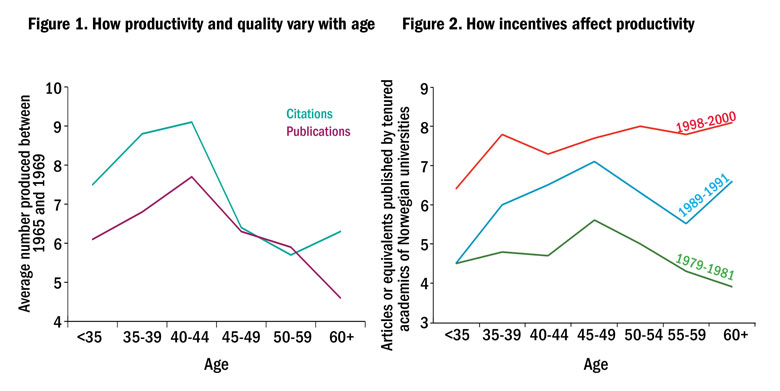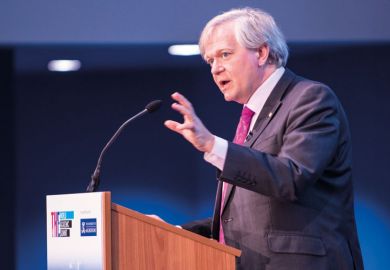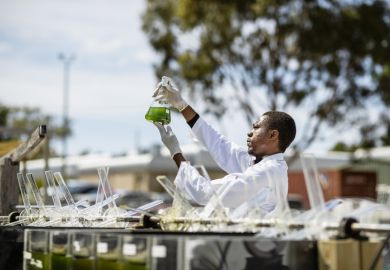Earlier this year, two academics from Concordia University in Canada made waves with a paper claiming that age negatively affects the quality of researchers’ publications. The paper, “How to boost scientific production? A statistical analysis of research funding and other influencing factors”, published in the journal Scientometrics, reported that the number of citations attracted by papers published by Canadian scientists and engineers tends to decline over time. It also found that productivity of papers relative to funding levels tends to peak about 12 years after publication of a researcher’s first paper.
“Considering the fact that funding is usually more biased towards senior researchers, we need to…highlight the importance of more equal funding distribution among young and senior researchers,” the paper concludes.
This echoes the complaint made last year by Nobel laureate Brian Schmidt, the vice-chancellor of the Australian National University, that institutions direct most of their money to academics over the age of 50 even though the “apex of productivity” for researchers is usually far earlier.
But not everyone agrees. Here, five senior scientists reflect on both the wider data and their own experiences of when – if at all – the academic golden years end.

The key to scientific productivity is not age but motivation and ability
That science is a young person’s game is considered a truism. Albert Einstein, who published the work for which he received the Nobel prize at age 26, is supposed to have remarked: “A person who has not made his great contribution to science before the age of 30 will never do so.” Another Nobel laureate, the University of Chicago economist Gary Becker, remarked in his blog in 2008: “Significant advances not only in mathematics, but also in biology (such as Crick and Watson), in economics, and even in humanities have typically been made by younger rather than older persons.”
The general acceptance of this belief led to dire warnings that the abolition of compulsory retirement at US universities in 1994 would decrease research productivity. In a 2015 blog post, Sally Rockey, then deputy director of the National Institutes of Health – the major US funding agency for biomedical research – even proposed setting up an “emeritus award”: a financial incentive for older scientists to stop conducting research.
Like so many truisms, the belief that science is advanced mainly by young innovators is wrong. When age has an effect, it is the middle-aged, rather than the young, who are most creative. This was shown in 2011 by Benjamin Jones and Bruce Weinberg in an analysis of the ages at which Nobel laureates did their award-winning research. In a paper, “Age dynamics and scientific creativity”, published in Proceedings of the National Academy of Sciences, they reported that the average age of those making their great achievements was 37.5 in physics, 40.2 in chemistry and 39.9 in medicine. Only 7 per cent of Nobel laureates were younger than 30 when they did the research for which they won their prize.
A similar pattern has been found in studies using measures of scientific productivity, such as the average number of articles published or citations garnered. Dean Simonton, an expert on determinants of scientific creativity, argued in a 1997 paper, “Creative productivity: a predictive and explanatory model of career trajectories and landmarks”, published in Psychological Review, that citations are the best single measure of scientific creativity and correlate highly with both ratings of scientific eminence by peers and the receipt of professional honours such as Nobel prizes and US National Medals of Science. Since the number of publications and the number of citations are highly correlated, quality of output – that is, creativity – is a positive function of quantity.
Figure 1, below, shows the finding of a classic study by Stephen Cole, published in 1979 in the American Journal of Sociology. In a paper titled “Age and scientific performance”, he compared the publication and citation rates of 2,460 scientists of different ages and from six different disciplines between 1965 and 1969. The pattern he found is typical of the many studies of that period, with productivity and creativity peaking at age 40 to 44.
The consistency of these findings probably accounts for the fact that few studies have been conducted more recently. But this is unfortunate, because in the past few decades the academic job market has become much more competitive and publication pressure has increased. Both are likely to have increased publication rates of scientists of all ages.
Source: Figure 1 adapted from “Age and scientific performance” by S. Cole, 1979, American Journal of Sociology. Figure 2 reprinted with permission from “Does the aging of tenured academic staff affect the research performance of universities?” by S. Kyvik and T. B. Olsen, 2008, Scientometrics, 76 (Springer).
The clearest demonstration that changes in the incentive system can have a more powerful impact than age on publication rates comes from studies conducted in Norway. In an article called “Does the aging of tenured academic staff affect the research performance of universities?”, published in Scientometrics in 2008, Svein Kyvik and Terje Bruen Olsen reported the findings of three surveys of academic staff at Norwegian universities between 1980 and 2000 (see Figure 2, above). Whereas the earlier surveys show a typical peak in output at ages 45 to 49, the peak had disappeared by 1998.
In a 2015 paper in Studies in Higher Education, titled “Explaining the increase in publication productivity among academic staff: A generational perspective”, Kyvik and Dag Aksnes estimated that there had been a 30 per cent rise in the number of papers published across all age cohorts during the past two decades. And two surveys that were conducted between 2005 and 2007 and 2011 and 2013, using a newly instituted database with complete coverage of all Norwegian scientific publications, suggested a further 24 per cent increase (although because the number of authors of Norwegian journal articles doubled between 1981 and 2012, part of the increase in productivity is likely to be a result of the greater incidence of research collaboration).
Additional evidence on the importance of motivation comes from a recent study of more than 6,000 Quebec scientists published in 2008 by Yves Gingras and colleagues in Plos One. Their paper, “The effects of aging on researchers’ publication and citation patterns”, examines average productivity between 2000 and 2007. They report a decline after age 50 – but not among professors who remained active. The latter’s productivity stayed high, and the average number of articles that they published in high-impact journals and that were highly cited both rose steadily up to the age of 70. Because, at that stage in their career, external pressures will have eased, the fact that these active professors kept publishing can be seen as an indication of high motivation.
Working in the Netherlands, a country where age discrimination is still rampant and university professors are forced to retire at age 65, I was fortunate that my university offered me an “honorary professorship”, which meant that I could continue my research after 2006 for five more years. Freed of administration and teaching, these years were the most productive of my career. When my working conditions at Utrecht University deteriorated at the end of that five-year period, the University of Groningen kindly offered me refuge. I continue to study all the issues that have always interested me, including scientific fraud, American gun violence and grade inflation at US universities. To my surprise, these articles not only get published in good journals, most are highly cited as well. Since I am no longer an honorary professor, I can no longer apply for research funding. This means my publication rate will ultimately decline. But it will have peaked at age 70, and the decline will be entirely due to external circumstances.
Thus, the fear that the greying of academia will reduce scientific productivity is unfounded. As I noted in a 2010 review in American Psychologist, titled “The graying of academia: Will it reduce scientific productivity?”, age effects actually account for less than 8 per cent of the variance in the studies of academic productivity mentioned above, indicating that other factors are far more important. The strongest predictor of success has always been past performance, which shows that individual differences in motivation and ability are the major determinant. According to Simonton, the top half of most productive psychologists are responsible for 90 per cent of total output: a distribution typical for all sciences. So a highly prolific scientist at the age of 60 or 70 will outperform a less productive scientist of half that age. Research productivity could, in principle, be improved by inviting only the top half of productive scientists to continue after age 65. But that would be age discrimination unless such a selection were to be instituted for all age groups.
Wolfgang Stroebe is a visiting professor in the Faculty of Behavioural and Social Sciences at the University of Groningen, the Netherlands.

There are many reasons why I’ve never been able to replicate such a rate of publication, and none relates to declining mental powers
When asked recently what part of my career I enjoyed most, I unhesitatingly said my postdoctoral experience. That was the time when I felt most unfettered in my ability to choose my own directions and to work ridiculously long hours – for the fun naturally arising from never knowing what new insights might be just around the corner. During a two-year postdoc in the US, I produced 16 papers, and during the next two back in the UK (as a research council research fellow), I published another 15. Undoubtedly that was when I was most productive in terms of sheer number of papers per annum. It was possibly even my most creative period, although I don’t know how to quantify that.
So do I believe that this demonstrates that it’s been downhill all the way thereafter? Absolutely not. There are many reasons why I’ve never been able to replicate such a rate of publication, and none of them relates to my declining mental powers. At least, that’s what I believe!
As a newly independent researcher, productivity inevitably declines while setting up a lab and training a first generation of research students. Young lecturers also face the enormous time demands of delivering that first, scary lecture course. Delivering it a second time, even if the course is nominally identical, may still need hours of reworking and rethinking. And so it goes on. As I progressed up the career ladder, I certainly found that an ever-growing list of tasks was tossed in my direction. That memory of untrammelled freedom to explore the world of polymers hands-on, hour after hour, rapidly faded.
I minded that. Of course I did. I initially found it deeply frustrating to be able to carry out research only through the medium of others. Then, after a while I became resigned to the fact that my creativity was limited to writing research grant proposals, refereeing other people’s applications and talking through other people’s results, trying to synthesise new ideas from their findings.
In recent years, my responsibilities have shifted again. When people challenge me as to whether I am wasting my brain by becoming more administrator than researcher, I have long replied that I am content to work to create an environment where early career researchers can thrive: someone needs to do the work to make that possible. To me, this is a natural progression. Each successive generation comes in with new ideas and the ability to upend received wisdom. It doesn’t bother me, nor convince me that my brain is failing. I hope I remain productive and creative, but in totally different ways from the paper-writing machine I once was.
Dame Athene Donald is professor of experimental physics at the University of Cambridge and master of Churchill College, Cambridge.

I was still about as useful as I had ever been. While I was slower at some things, I had a better grasp of the big picture
Retirement was still mandatory when I reached the age of 65 in 2006. Although exceptions were made by the Medical Research Council’s Laboratory of Molecular Biology in Cambridge, where I had worked for 37 years, they were mostly for Nobel laureates. So it became clear in about 2002 that I could not take on any more students, and I began to feel like a lame duck.
Still, the system went on assessing me as more than adequate right up to the end, and I personally thought that I was still about as useful as I had ever been. While I was slower at picking up new methods and remembering and processing facts, I had more experience and a better grasp of the big picture.
I begged space in the University of Cambridge and, to my relief, was offered some – provided I obtained external funding. The Wellcome Trust kindly supported me with the costs of research and salaries for three colleagues (I did not want a salary for myself). I am now on my fourth grant from the trust, and my current one still has four years to run.
In connection with an article that I wrote for Nature in 2008 calling for the abolition of mandatory retirement, I interviewed other older scientists, mostly in the US but also in Australia, where mandatory retirement had been outlawed years earlier. I found that many of them continued to contribute, mentoring younger researchers and helping with teaching and administration. But the fears of administrators and junior faculty that they would selfishly cling on to positions and responsibilities long after they ceased to be productive has proved largely false. Most of them quietly leave the lab as their usefulness wanes.
Now in the UK, too, the laws on retirement have weakened their grip, and several of my department’s most productive scientists, by any measure, are over or well over retirement age. Looking back, some of my favourite memories from the Laboratory of Molecular Biology relate to the wisdom I acquired from brilliant scientists. Francis Crick and Max Perutz taught me the importance of having a large, apparently insoluble problem to aim at. Sydney Brenner’s incisive and Wildean wit cast so much light on the perverse and ridiculous aspects of scientific life. And Mark Bretscher taught me that what matters is the scientific problem, not the experimental system.
To escape mandatory retirement in Europe, Crick went to California, and Brenner – who is still working – became a scientific world traveller. But Perutz was allowed to stay on, completing his last paper the day before he died at 87. If these people had not carried on working, it would have impoverished us all.
Peter Lawrence is an MRC emeritus scientist in the department of zoology at the University of Cambridge.

Simplistic assessments of productivity versus age fail to consider many biasing or confounding factors
The variation of productivity between scientists has long been known to follow a logarithmic (Zipf) distribution, with a slope of about −2. That means that for every 100 scientists who produce one paper (or grant or citation) in a certain period, there are 25 who produce two and one highly productive soul who produces 10. Age plays no role in this relationship.
As academics get older, their sheer knowledge of the literature – and especially the wider literature needed for multi- and interdisciplinary studies – necessarily increases. It is very hard to reason about literature you have not studied, and with peer-reviewed papers in biomedicine alone appearing at the rate of more than two per minute, it is hard to keep up with the present, let alone the past.
There are plenty of professors who are usefully active and inspire the young until their death. The Nobel laureate Sir Hans Krebs, who died in 1980, was one I knew. But the main point I would make is that simplistic assessments of productivity versus age fail to take into account many biasing or confounding factors.
The first is one’s field of activity. Some fields, such as cellular biomedicine, are more populated and allow both more discoveries and more citations. Mathematicians are widely (and somewhat dispiritingly for the over-thirties) considered to do their best work when particularly young, and their creativity arguably depends a little less on the literature. That said, Andrew Wiles spent some 10 years on Fermat’s last theorem before publishing its proof aged 41, and Grigori Perelman was barely younger when he resolved a conjecture made in 1904 by (a 50-year-old) Poincaré. Interestingly, the productivity of Fields medallists appears to drop after they win the prize, but the same does not happen to non-winners considered to be of equal standing.
Of course, there is now a lot more to learn before a mathematician might make a breakthrough on an established problem. Similarly, I have been told that it takes 10 years to learn enough about string theory to make a “serious” contribution. In particle physics, there is only one Large Hadron Collider with which to experiment, which necessarily limits productivity in that field. Similarly, it is easier (more productive of papers) if one works on microbes that replicate in 20 minutes than those that take three months. For these reasons, it makes little sense to compare productivities across different (or often even similar) fields.
The second confounding factor relates to geography. In biomedicine, the average age at which biologists secure their first independent grant from the US National Institutes of Health is 42. In countries that experience economic difficulties, the productivity of scientists will clearly drop as funding declines – but younger colleagues may be more able to move to more favourable economic climes. This too will seem to appear as an age-related drop in productivity.
A third confounding factor is that many successful people commonly leave the system (in whole or in part) in their middle age. There is, of course, a well-known gender difference here, but becoming a departmental head, dean or other senior administrator typically does not help to increase research productivity (and one might hope that those who are chosen for such roles had earlier shown evidence of high productivity). That of itself would lead to an apparent age-related decrease in productivity (though I hope not in my own case!).
So I doubt that there is anything worthwhile to discover about a presumed generic relation between age and productivity when these and other confounding factors are taken into account. Like Miss Jean Brodie, one can be in one’s prime at any age.
Douglas Kell is research chair in bioanalytical sciences at the University of Manchester and is a former chief executive of the Biotechnology and Biological Sciences Research Council.

There aren’t many footballers over 35, but football managers have more in common with most of the rest of the workforce: they seem to get better with age
Certain body parts take the onset of late maturity as starter’s orders for a flourish of pointless activity. For men, nasal hair and the prostate gland are the most obvious culprits. The former surely gives students cause for endless hilarity, but I know of no evidence that a superfluity of nasal hair affects one’s ability to teach or do research.
Other body parts, sadly, get smaller rather than bigger. That rather important one, my brain, has been losing a million (or is it a billion?) cells every day since my twenties. I’m assured, however, by people who understand these things that this doesn’t matter: IQ continues rising for decades after the tally of moribund brain cells achieves apparently alarming proportions.
Yet age prejudice seems to be the last bastion of acceptable bigotry. I’m counting the “jokes” made publicly about colleagues’ ages: in the past year there have been three that would, if made in the context of body appearance or gender, say, be cause for instant dismissal.
People bemoaning the ageing academic workforce often centre their complaints around the declining energy and creativity of the older academic. But there’s little real evidence for this. In fact, I’m not sure how being young is an advantage on any measure other than physical prowess. There aren’t many footballers over 35, but football managers have more in common with most of the rest of the workforce: they seem to get better with age. The newly elected leader of Her Majesty’s Opposition is 66. All three of the remaining candidates in the US presidential race are over 60.
In the US, academics regularly continue working full-time into their seventies. Recent surveys show that three-quarters of them plan to work beyond 65, 60 per cent want to stay beyond 70, and 15 per cent intend to continue working until they’re 80.
The same may happen here, now that age discrimination by employers has been outlawed. An abundance of white-haired professors may mean that there’s an even greater squeeze on opportunities for younger academics, and a slowdown in churn may prevent new blood and new ideas flowing into the system. Worries about this – or, more realistically, about older academics costing much more than younger ones – are encouraging US universities to offer buyouts to senior professors. But they aren’t being tempted: reportedly, when Hofstra University’s School of Law offered two years’ salary to older employees to retire, not a single one accepted. In the long run, of course, as John Maynard Keynes said, we’re all dead, so Hofstra shouldn’t worry unduly.
I can understand someone who does an unfulfilling job – an estate agent or a lawyer, say – yearning for a life of endless Viking river cruises beyond their 65th birthday. But why would anyone want to give up being paid to think, work and debate with interesting colleagues and bright students?
Gary Thomas is professor of inclusion and diversity at the University of Birmingham.
POSTSCRIPT:
Print headline: There’s life in the old dog yet
Register to continue
Why register?
- Registration is free and only takes a moment
- Once registered, you can read 3 articles a month
- Sign up for our newsletter
Subscribe
Or subscribe for unlimited access to:
- Unlimited access to news, views, insights & reviews
- Digital editions
- Digital access to THE’s university and college rankings analysis
Already registered or a current subscriber?









